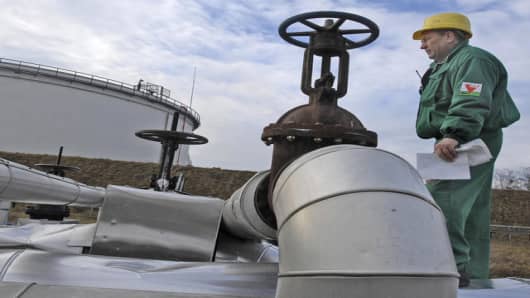Energy futures fell in quiet holiday trading Monday as investors, questioning whether oil will keep surging to new highs, decided to cash in some of their recent profits.
Selling picked up momentum after Royal Dutch Shell announced it would boost production at a Nigerian oil platform shuttered by violence last year. But trading volumes were low as many traders were off for Columbus Day and a national holiday in Japan.
"It's the old Monday [routine]... a little bit of liquidation," said Tom Kloza, publisher and chief oil analyst at the Oil Price Information Service.
After rallying 20 percent from late August to late September, oil futures have settled into a trading range around $80 per barrel.
Daily prices have been volatile at times as investors have debated whether demand for crude and petroleum products will be strong enough in the fourth quarter to support $80 per barrel oil.
While some analysts point to ebbing demand for gasoline and forecasts for high temperatures through December as signs the oil, gasoline and heating oil markets are adequately supplied, others say low heating oil inventories and refinery activity shows supplies are tight.
As a result, some analysts believe oil will fall to $65 a barrel or lower, following a typical seasonal pattern, while others expect futures to break that pattern and push toward $90 a barrel.
U.S. light, sweet crude for November delivery fell $2.20 to settle at $79.02 per barrel on the New York Mercantile Exchange, its lowest close in nearly a month.
Gasoline for November fell 4.91 cents to settle at $2.0002 per gallon.
Nymex heating oil fell 6.39 cents to settle at $2.1596 per gallon.
Natural gas futures fell 22.7 cents to settle at $6.846 per 1,000 cubic feet, extending Friday's 33.9 cent decline. Analysts say investors are selling off a "storm premium" that had been built into natural gas prices; the market now believes that no tropical weather systems pose a serious threat to critical gas and oil infrastructure in the Gulf of Mexico.
At the pump, meanwhile, gas prices slipped 0.3 cent overnight to a national average price of $2.767 a gallon, according to AAA and the Oil Price Information Service. Prices remain nearly 50 cents higher than one year ago, and nearly 50 cents below their May peak of $3.227 a gallon.
Gas prices have not risen back to the $3 range, as many analysts had expected, to keep up with oil's September surge. Some analysts think gas will hover around $2.75 a gallon for the rest of the year.
Analysts think this year's record gas prices have cut demand. That has kept prices from rising, but at the same time, high oil prices have kept gas from falling. Many analysts believe oil's September rally was largely due to an influx of speculative money.
While energy futures were lower all day, selling accelerated after Royal Dutch Shell said it was lifting "force majeure" on its Forcados oil terminal in Nigeria, which can pump 380,000 barrels of oil a day at full capacity. Force majeure is a legal condition under which a company can not be held liable for not meeting contractual obligations to customers.
The Forcados terminal was shut down by militant attacks in February 2006, but has been operating at 1 percent to 3 percent of capacity since this summer. In recent months, violence has abated in Nigeria, Africa's biggest oil producer and one of the top overseas suppliers to the United States.


